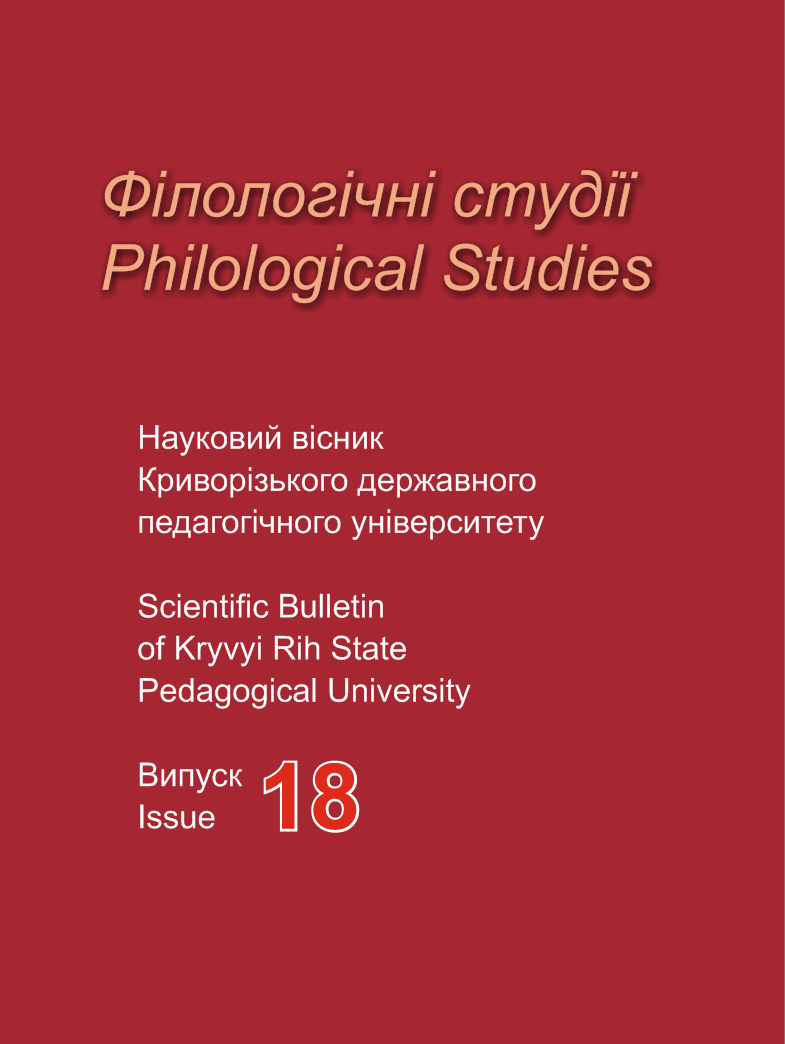Concept of consent: universal model of concerted communication
DOI:
https://doi.org/10.31812/filstd.v18i0.2124Keywords:
concept of consent, concerted communication, etymological and modern linguospecificity, semantic interpretationAbstract
The author of the article refers to the wide interpretation of the concept of consent, which represents the ethical concepts of effective communication, belongs to the important characteristics of the behaviour of the individual in society. Thescientific consideration of the concept from the standpoint of language, the clarification of its cognitive and pragmatic features, makes it possible to identify one of many motivational forms of the mental representation of knowledge about concerted communication.In the perception of the concept, we could find a pragmatic approach, such as: “understanding, consensus, agreement, confirmation, assignment”. By the analysis of the vocabulary definitions, we conclude that the content structure of the concept has etymologically inherited and modern interpretations. Firstly, the concept of consent is etymologically correlated with the logical-philosophical and ethical categories and concepts, and imply peace, goodness, truth, the ability of the interlocutor to the desired actions. From etymological preconditioned interpretation of “peaceful” it was inherited meaning “harmony, friendship, order, agreement, consistency”. Secondly, over time, the basic constant of the concept “peaceful” was supplemented, reflecting the modern ethno-linguistic consciousness of Ukrainians.
In the perception of the concept, we could find a pragmatic approach, such as: “understanding, consensus, agreement, confirmation, assignment”. Therefore, in contemporary dictionaries, the concept of consent is widely interpreted, enabling its semantic interpretation in the plane of cooperation, compromise, avoidance and assignment.
Metrics
References
Бондаренко О. С. Концепти “чоловік” і “жінка” в українській та англійській мовних картинах світу : автореф. дис. ... канд. філол. наук : 10.02.17. Донецьк, 2005. 19с.
Василенко О. М., Семенишин О. І. Лінгвокультурні концепти “Воля/Свобода (Liberty/Freedom)”. Гілея : науковий вісник: зб. наук. праць. Київ, 2016. Вип.104 : “Філософські науки”. С.116−119.
Войцехівська Н. К. Категорія згоди в українському літературному діалогічному дискурсі (на матеріалі художньої літератури ХХ –поч.ХХІ століть) : дис. ... канд. філол. наук : 10.02.01. Київ, 2009. 288с.
Дробішевська У. Концепт “щастя”в українській і польській фразеології. Етнос і культура. 2011. No 8−9. С.125−130.
Д’яконова О. В. Вербалізація концепту ЩАСТЯ в німецькій та українській лінгвокультурах: на матеріалі романтичної лірики ХІХст. Мовні і концептуальні картини світу. 2012. Вип.41. Ч.2. С.20−26.
Етимологічний словник української мови : у 7т. / НАН України, Інститут мовознавства ім. О. О. Потебні. Київ : Наукова думка. Т.1: А–Г / уклад.: Р. В. Болдирєв та ін. 1982. 632с.
Караванський С. Й. Практичний словник синонімів української мови.2-е вид. Київ : Українська книга, 2004. 448с.
Коломієць К. Концепт вірив українській мові. URL:http://ukrconf.fl.kpi.ua/wpcontent/uploads/2014/12/51._Kolomiyets_Kateryna.pdf (дата звернення: 12.10.2018).
Макарець Ю. С., Сліпчук О. М. Концепти рід, родина, сім’я в мовній картині світу українців. Наукові записки Ніжинського державного університету ім. Миколи Гоголя. Серія : Філологічні науки. Ніжин, 2013. Кн.1. С.75−78.
Малиновська Г. Концепт “ГРОШІ” в українській мовній картині світу. Українська мова. 2010. No 4. С.75−84.
Мартинюк А. П. Словник основних термінів когнітивно-дискурсивної лінгвістики. Харків, 2012. 196с.
Місінькевич О. Концепт культури як одиниця ментальної інформації у мовній картині світу. Мандрівець. 2014. No1. С.53−57.
Скаб М. В. Концептуалізація сакральної сфери в українській мові :автореф. дис. ... д-ра філолог. наук : 10.02.01. Київ, 2009. 36с.
Словарь української мови : у 4-хт. / за ред. Б. Д. Грінченка. Київ, 1907–1909. URL:https://r2u.org.ua/dataСловарьукраїнськоїмови(1907−1909).pdf (дата звернення:15.10.2018).
Словник української мови : в 11-тит. / АН УРСР. Інститут мовознавства ; за ред. І. К. Білодіда. Київ, 1970‒1980.Т.3. 1972. 744с.
Філософський енциклопедичний словник / голов. ред. В. І. Шинкарук. Київ, 2002. 742с. URL:http://shron1.chtyvo.org.ua/Shynkaruk_Volodymyr/Filosofskyi_entsyklopedychnyi_slovnyk.pdf (дата звернення:14.10.2018).






